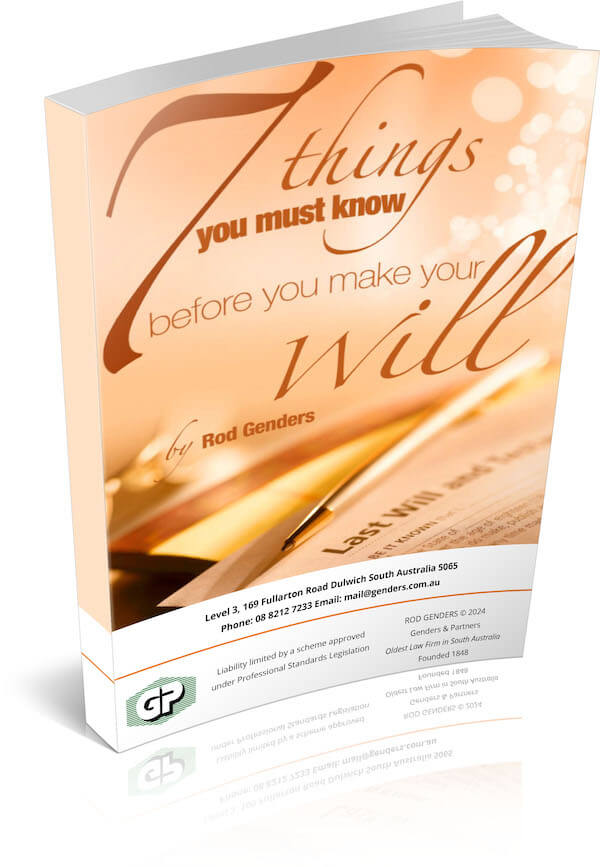
New Year’s resolutions are an ancient tradition, stretching back millennia. Over 4,000 years ago the Babylonians were the first people to make New Year’s resolutions.
Every year at this time, millions of people make resolutions promising improvements in their lives.
Alcohol will be forsworn, exercise embraced, hobbies sought, healthy eating vowed. It makes sense to respond to the indulgences of Christmas with this sort of healthy catharsis.
Those pledges to do more exercise and drink less alcohol require resolve and determination and courage.
Courage is not the absence of fear.
It is doing the right thing in spite of the fear.
One of our greatest fears is to honestly contemplate our own mortality, and so we put-off getting our affairs in order.
We know that we need to make a plan that will protect us, our family and our assets. But we tend not to prioritse this in our daily life.
In addition to creating a Will for ourselves, we should also reflect upon the sort of accommodation, care and treatment we would prefer later in our life.
As we age, we increasingly tend to look backwards, sometimes with longing to a simpler and more comfortable time in our lives when we were in greater control of our destiny.
However, as we age, we also need to look forward – to honestly confront our changing circumstances and requirements.
Our health, independence and mobility are likely to undergo changes, calling for a genuine appraisal of our likely future-needs.
So in addition to creating a Will, we also need to consider other documents in our modern integrated estate plan.
The ageing process can have consequences for family dynamics, as the older generation begins to require increasing amounts of care.
Generally, older people want to remain living in their own home for as long as possible. Some can be proud and stubborn, and almost all of us are insistent about maintaining our mobility, independence and quality of life.
However, remaining in the home becomes a concern when we are slowing down, perhaps even having trouble with handling stairs and doing general daily activities.
Our mental and physical health may start to decline, and there may be a growing appreciation of the desirability of engaging support services or other accommodations for ourselves or our spouses.
This is the time to evaluate how best we can manage and control our lives – now and into the future. What do we need to do to make life safe and secure for ourselves and our loved ones in anticipation of aging disabilities that may occur?
The first step is to ensure that somenon we trust has the lawful authority to make decisions and sign documents on our behalf, by naming them as our agent in some important legal documents.
General Enduring Power of Attorney
This document allows a person to appoint someone we know and trust to make important decisions about financial, property and legal matters.
This authority can be activated straight away or alternatively it can be set to only activate if and when we lose our mental competence (known as ‘capacity’).
It is a document by which we authorise another person or persons to act for us during our lifetime in respect of our legal & financial affairs (contracts, bank accounts, government departments, shares, real estate, insurances, leases, etc).
An Enduring Power of Attorney continues to operate in the event that we later become mentally incapacitated after, for example, an accident or suffering a stroke or developing dementia.
By creating an Enduring Power of Attorney we do not lose control over our own affairs while we are still able to manage them.
Advance Care Directive
An Advance Care Directive broadly has two main objectives: a health care proxy and a Binding Refusal of Medical Treatment (sometimes known as a Living Will).
The healthcare proxy can be thought of as a power of attorney for health care, and it designates a person, such as a spouse or trusted friend, who can legally act as our agent, making medical decisions for us if we are incapacitated.
The Binding Refusal of Medical Treatment portion describes the type of care you would want if we are critically ill. It is sometimes known as Do Not Resuscitate Command.
Once we appoint a carer or guardian for ourselves, we need them to address such questions as “Would we want to live in a persistent vegetative state with a feeding tube, despite the long-term costs?” or “Would we rather that the tube be withdrawn and die naturally with dignity?”
End-of-life guidelines are as much for the living as for the dying. Without specific instructions, family members may have to decide whether we would want to be kept alive artificially, what level of disability we’d be willing to live with and how to let us die if we had no hope of recovery.
Both the Power of Attorney and Advance Care Directive can assist our loved ones to care for us in the latter part of our lives, and both should be created with a Last Will & Testament, by an experienced lawyer specialising in Estate Planning.
All these important legal documents should be setup to work in an integrated fashion, and kept up to date.
Don’t Leave This Too Late
The ageing of Australia’s population is well-known, and yet many Australian families are still not well-prepared for its consequences. Estate planning is not just for the wealthy.
It is essential for every family to put in place, and it must be done properly. Don’t leave it too late.
Once a person has lost their capacity (such as through stroke, accident, senility, dementia, Alzheimer’s etc) then they may have permanently lost their ability to create these sorts of legal documents.
In summary, each of us needs to create these documents NOW (even if this is before we think we need such documents). If we wait until we need them, it will probably be too late to create them.
So my recommendation is to make a list of all the things we already know we should be doing, and just get on with doing them – no more procrastinating. Be so busy living our life that we have no time for hate, regret or fear.
PS You should also encourage your family to also create their own estate plans. Perhaps you could assist them financially to achieve this vitally important goal this year. Now that’s a good New Year’s Resolution.
For more information on creating a modern integrated estate plan or other estate planning topics, explore our articles and visit our website today to schedule your consultation!
SPECIAL REPORT “7 Things You Must Know Before You Make Your Will”
In this report you will Learn:

Why home-made Wills can be a LOT more expensive than you might think.
The secret weapons used by the rich & powerful to protect their assets, and transfer their wealth two or three generations ahead.
How Estate and Trustee Companies make BIG money from “free” Wills.
The Most Common Estate Planning Mistakes, how they can cost your family a fortune, and How to Avoid Them.
The Elements of a Sound Estate Plan – why a Will alone is not enough.
How to Make Sure Your Assets Stay in Your Family and are not lost to creditors, lawsuits or ex-spouses.
How to guard against challenges to your Estate after you’re gone.







